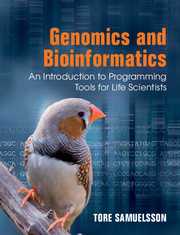Book contents
- Frontmatter
- Contents
- Preface
- Acknowledgements
- Design and conventions of this book
- 1 Introduction: working with the molecules of life in the computer
- 2 Gene technology: cutting DNA
- 3 Gene technology: knocking genes down
- 4 Gene technology: amplifying DNA
- 5 Human disease: when DNA sequences are toxic
- 6 Human disease: iron imbalance and the iron responsive element
- 7 Human disease: cancer as a result of aberrant proteins
- 8 Evolution: what makes us human?
- 9 Evolution: resolving a criminal case
- 10 Evolution: the sad case of the Tasmanian tiger
- 11 A function to every gene: termites, metagenomics and learning about the function of a sequence
- 12 A function to every gene: royal blood and order in the sequence universe
- 13 A function to every gene: a slimy molecule
- 14 Information resources: learning about flu viruses
- 15 Finding genes: going ashore at CpG islands
- 16 Finding genes: in the world of snurpsp
- 17 Finding genes: hunting for the distant RNA relatives
- 18 Personal genomes: the differences between you and me
- 19 Personal genomes: what’s in my genome?
- 20 Personal genomes: details of family genetics
- Appendix I Brief Unix reference
- Appendix II A selection of biological sequence analysis software
- Appendix III A short Perl reference
- Appendix IV A brief introduction to R
- Index
- References
19 - Personal genomes: what’s in my genome?
Published online by Cambridge University Press: 05 August 2012
- Frontmatter
- Contents
- Preface
- Acknowledgements
- Design and conventions of this book
- 1 Introduction: working with the molecules of life in the computer
- 2 Gene technology: cutting DNA
- 3 Gene technology: knocking genes down
- 4 Gene technology: amplifying DNA
- 5 Human disease: when DNA sequences are toxic
- 6 Human disease: iron imbalance and the iron responsive element
- 7 Human disease: cancer as a result of aberrant proteins
- 8 Evolution: what makes us human?
- 9 Evolution: resolving a criminal case
- 10 Evolution: the sad case of the Tasmanian tiger
- 11 A function to every gene: termites, metagenomics and learning about the function of a sequence
- 12 A function to every gene: royal blood and order in the sequence universe
- 13 A function to every gene: a slimy molecule
- 14 Information resources: learning about flu viruses
- 15 Finding genes: going ashore at CpG islands
- 16 Finding genes: in the world of snurpsp
- 17 Finding genes: hunting for the distant RNA relatives
- 18 Personal genomes: the differences between you and me
- 19 Personal genomes: what’s in my genome?
- 20 Personal genomes: details of family genetics
- Appendix I Brief Unix reference
- Appendix II A selection of biological sequence analysis software
- Appendix III A short Perl reference
- Appendix IV A brief introduction to R
- Index
- References
Summary
Be nice to the whites, they need you to rediscover their humanity.
(Archbishop Desmond Tutu)If we have access to the genome sequence of an individual there are a very large number of questions to be posed regarding that genome. For instance, what genetic markers are present that are of a predictive value in medical terms? What trait and disease alleles are present? What genetic properties are present that make the individual sensitive or resistant to a certain drug treatment? We may also want to know about the relationship of the individual to other individuals and whether there are markers characteristic of a certain human population. These are all questions that may be addressed using bioinformatics tools. In the previous chapter we examined SNPs and used them to get an idea about the genetic differences between individuals in general. Here, we will again use SNP data to analyse genomes, but we will see how we may identify SNPs that are shared between a group of individuals. We will also illustrate how SNP data may be mapped to information regarding exons, thus identifying SNPs that are likely to be in coding regions. In this way we are able to learn about the consequences of different SNPs at the level of protein products. The genomes that we are to examine are those of a few South African individuals. These genomes also highlight interesting questions regarding the early history of man.
- Type
- Chapter
- Information
- Genomics and BioinformaticsAn Introduction to Programming Tools for Life Scientists, pp. 252 - 265Publisher: Cambridge University PressPrint publication year: 2012



